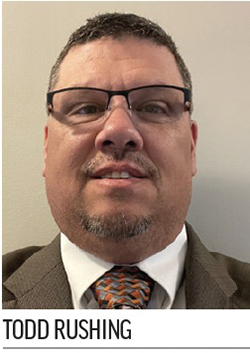Airports Reap the Benefits of Cooperative Purchasing

Hundreds of airports are harnessing the power of cooperative purchasing for everything from pencils to multimillion-dollar fire trucks to airfield striping services, and they’re enjoying streamlined procurement and often better pricing as a result. Sourcewell, a cooperative created by the Minnesota legislature as a local unit of government, simplifies the buying process by developing requests for proposals and bid invitations for national, competitive solicitations that meet or exceed most local requirements. Government and education entities can then purchase goods and services using hundreds of Sourcewell supplier contracts at no additional cost. The companies that provide the goods and services pay an administrative fee to Sourcewell based on a percentage of sales processed through the awarded contract, and value the ease of offering services through a cooperative contract compared to responding to hundreds of individual solicitations from government and education entities.
 Airports and others that qualify for the program can take advantage of group buying power, with most goods and services delivered through local dealers or representatives. “It’s a win-win buying scenario for airports or any local entity,” remarks Kip Hines, brand manager with Sourcewell.
Airports and others that qualify for the program can take advantage of group buying power, with most goods and services delivered through local dealers or representatives. “It’s a win-win buying scenario for airports or any local entity,” remarks Kip Hines, brand manager with Sourcewell.
Currently, more than 350 municipal airports throughout North America use Sourcewell’s cooperative purchasing contracts. Hines notes that participation may actually be significantly higher. “If cities or counties are purchasing on behalf of their local airport, we won’t know it,” he explains. “We are just happy to streamline their buying process with contracted goods and services that can be used throughout any community.”
|
Project: Cooperative Purchasing Program: Sourcewell Participants: 350+ North American airports (50,000 overall government & education entities) Sample Participants: Ithaca (NY) Tompkins Int’l Airport; Louisville (KY) Muhammad Ali Int’l Airport Cost: No additional expenses for purchases Sample Suppliers & Service Providers: Grainger; Hi-Lite Airfield Services; Lusk Mechanical; MB Companies; Schindler Elevator; Sherwin Industries Inc. Key Benefits: Efficient procurement; competitive pricing due to group buying power; industry-specific contracts; quality assurance; direct connections to vetted product/service providers |
How It Works
The program has contracts specifically tailored for the unique nature of municipal airports. “They require many of the goods and services utilized by other local governments and some airport-specific products, such as deicer, runway maintenance equipment and special firefighting tools,” Hines says. “Public purchasers at modern airports can overcome many of their unique buying challenges with Sourcewell contracts.”
All contracts are competitively solicited on behalf of 50,000+ participating entities. “Public procurement pros will save time and money by choosing from hundreds of contracted Sourcewell suppliers,” says Hines, adding that associated savings can then be used to offset other expenses. “When airport leaders use cooperative purchasing, they are tapping into procurement best practices to stretch their budgets.”
At no cost or obligation to purchase through Sourcewell, government entities can register for the program in minutes. After an airport receives its account number (usually within one business day), personnel can immediately purchase using the program’s established cooperative contracts. Naturally, airports pay the purchase price for goods and services, but they often save time and money due to the streamlined buying process.
One Airport’s Experience
Ithaca Tompkins International Airport (ITH) in Central New York used to rely on its own airfield maintenance staff to paint runway and taxiway markings, but eventually began hiring outside contractors. Although that saved labor hours on the tarmac, the process of issuing a request for proposals was still time-consuming. “Going out to bid was very cumbersome,” recalls ITH Airport Deputy Director and Fire Chief Josh Nalley. “You’d hopefully get companies to bid on it. Then if they did, you had to review the bids and make your decision, and hopefully the product they are selling meets the specification or the bid was not eligible and you would have to start over.”
That prompted the county-owned airport to begin purchasing through Sourcewell in 2013. It selected Hi-Lite Airfield Services for painting and has used the company for various pavement maintenance projects ever since. The airport has also purchased equipment and supplies through the program, including a fire truck and associated equipment such as turn out gear, extrication tools and radios. “Sourcewell gives us a broader range of using vendors that might not be right in New York State, but it all follows the same rules,” Nalley explains. “They have a contract price, and if we enroll in that through the county purchasing, we’re able to purchase goods or build contracts out of that program.”

ITH also leverages Sourcewell contracts for supplies such as deicing materials and fuel for ground support vehicles. Other purchases made through the program include mowers, equipment attachments and implements for airfield vehicles.
Due Diligence
Louisville Muhammad Ali International Airport (SDF) began investigating cooperative purchasing agreements several years ago. Personnel researched how the bids were issued, how contracts were awarded and how suppliers performed over time. Based on the results, the team determined that it was in the airport’s best interest to adopt the alternative procurement process to supplement its own bidding process, and SDF began using Sourcewell to order select products and services in 2019. The airport qualified for the program as a political subdivision of the city of Louisville.
Through Sourcewell, SDF has purchased nine pieces of snow removal equipment from MB Companies over the last three years and various equipment from other Sourcewell contract providers. The Kentucky airport also maintains a service agreement with Schindler Elevator and has an indefinite delivery/indefinite quantity contract with Lusk Mechanical. At any given time, SDF has 18 to 24 active agreements through Sourcewell.
 Each time an award is made, the airport evaluates that contract against its existing price schedule to determine if it wants to establish a new contract for supplies or services. “There’s an internal investigation and evaluation process that we do before we jump on board with any Sourcewell agreement,” specifies SDF Purchasing Director Curtis Monroe.
Each time an award is made, the airport evaluates that contract against its existing price schedule to determine if it wants to establish a new contract for supplies or services. “There’s an internal investigation and evaluation process that we do before we jump on board with any Sourcewell agreement,” specifies SDF Purchasing Director Curtis Monroe.
When SDF personnel identify a Sourcewell contract that could benefit the airport, a team determines if it would like to use it. At that point, the contract is ready to go, and the price is established, so SDF can save significant time. “We’re usually beating products on our shelves or in our hands at least two to three weeks in advance versus bidding ourselves,” Monroe remarks.
Because the airport receives federal funding for some projects, specific requirements must be included in purchase contracts to meet FAA guidelines. “We tailor-make the Sourcewell agreement into a Louisville Regional Airport Authority agreement that includes those additional terms and conditions,” Monroe explains, adding that none of the program’s manufacturers or distributors have balked about the contract changes.
In May, SDF began ordering airfield runway closure signs and patch material for runway landing fields from Sherwin Industries Inc., a relatively new Sourcewell supplier. The company added an important product line to the program early this year when it won a contract for airport runway materials and related supplies/services. Todd Rushing, an airfield safety specialist with Sherwin Industries Inc., reports that the company has since worked with 15 airports throughout North America via the program.
Benefits and Impacts
Like other employers, many airports are currently experiencing staffing crunches. But public entities still must adhere to local procurement laws—even when they are understaffed. Sourcewell helps airports and other public entities stay in compliance when purchasing goods and services but spares them lengthy bidding processes. “We’ve done the competitive solicitation already, so airport staff can focus their resources on buying and improving airport efficiency,” Hines says.
 Nalley reports that the cooperative purchasing program makes it much easier for ITH to move quickly on projects. “When you put a request for proposals out, you don’t know who you’re going to get. Nobody might bid on it, so then you’re back to square one after you’ve done all that work,” he comments.
Nalley reports that the cooperative purchasing program makes it much easier for ITH to move quickly on projects. “When you put a request for proposals out, you don’t know who you’re going to get. Nobody might bid on it, so then you’re back to square one after you’ve done all that work,” he comments.
When the airport uses Sourcewell companies and contracts, it can choose project partners based on professional abilities and expedite the entire process. “Instead of me going out and writing a spec on how I want airfield painting done, I can just hire the vendor and we can have an analysis of what we’re doing,” Nalley says. “We don’t have so many man-hours to try to get the same job done.”
In addition to decreasing time spent on upfront project administration, airports often pay lower prices for goods and services from Sourcewell suppliers. “Nine times out of 10, it gets you the best price,” Nalley comments.
In short, the program allows airports to get competitive pricing through a bid process without spending the time and money performing that process themselves. It also provides contractors or suppliers already familiar with FAA regulations. “It relieves some of their operational pressures by bringing in experts and having them assure that compliance is met rather than putting that on to operations departments, which are often stretched,” says P.J. Mills, director of marketing and business development with Hi-Lite Airfield Services.
 Cooperative purchasing through Sourcewell can provide assurance to airports that are wary of working with unfamiliar suppliers. “It’s just a great avenue to allow both suppliers and end users, in this instance airports, to connect through a tried, true and trusted government procurement program,” says Rushing, of Sherwin Industries. “It offers the suppliers a chance to put their best foot forward, and then allows the airport to know that it’s legally been competitively bid.” It’s part of Rushing’s job to ensure that Sherwin adheres to all governmental guidelines and that its pricing structure and format comply with the Sourcewell contract.
Cooperative purchasing through Sourcewell can provide assurance to airports that are wary of working with unfamiliar suppliers. “It’s just a great avenue to allow both suppliers and end users, in this instance airports, to connect through a tried, true and trusted government procurement program,” says Rushing, of Sherwin Industries. “It offers the suppliers a chance to put their best foot forward, and then allows the airport to know that it’s legally been competitively bid.” It’s part of Rushing’s job to ensure that Sherwin adheres to all governmental guidelines and that its pricing structure and format comply with the Sourcewell contract.
The program creates a more efficient workflow from beginning to end, Rushing adds. Even though there’s still paperwork involved for every purchase, it is easier for airports and suppliers alike because it follows an established and legally binding process. Cooperative purchasing also allows operations and maintenance personnel to work with purchasing staff, so they can decide on contracts as a team, rather than the purchasing staff simply looking at raw numbers or specifications. Rushing considers it a big advantage for airports to be able to buy from companies they trust and know they’ll receive good customer service and reliable warranties.
Advantages for Suppliers and Contractors
When suppliers respond to Sourcewell’s public request for bids, they must confirm their ability to offer contract pricing and customer service. They’re also required to provide information about their distribution network and detailed business plans. Sourcewell then awards contracts on price and qualifications, and approved suppliers or contractors can offer their goods and services directly to any airports or entities that are registered with the program. Each supplier contract has a base term of one year.
Hi-Lite Airfield Services has been a Sourcewell contractor since 2013. “It opens doors for us to approach airports that we’ve had really good relationships with—and we’ve built a rapport over the years—to be able to offer our services directly,” Mills says.
The company has provided pavement maintenance services such as rubber removal, pavement marking, preformed thermoplastic application, crack sealing, friction testing and sealcoating for dozens of airports through the program. Clients include Orlando International; Fort Worth Meacham International; Blue Grass Airport; Portland International Jetport; and Charlotte Douglas International.
Mills notes that using Sourcewell contractors can mitigate risk for airports. He reports that Hi-Lite conducted a study with a statewide program that discovered it could save hundreds of thousands of dollars over five years by switching from a traditional annual bid process to a long-term maintenance structure through Sourcewell.

The program also provides contract pricing for pavement marking and other services.
For suppliers, contracted prices yield a very simple quote process, Rushing adds. “It allows us to have less paperwork and really efficiently get to that quicker timeframe for [airports] to be able to purchase,” he explains. Products from Sherwin Industries available on contract through Sourcewell include portable lighted runway closure markers, paint striping machines, paint and glass beads for airfield markings, foreign object debris sweepers, airfield friction meters, delineators, low-profile barricades, construction lighting, preformed thermoplastic markings and pavement repair products.
Industry Hurdles
Supply chain issues have plagued airports, and virtually every other industry, for the past three years. With cooperative purchasing and contracted suppliers, public procurement staff can increase their odds of securing needed items on a reasonable schedule. “When time is money, reducing purchasing time is ultimately a way to maximize public dollar purchases,” Hines comments.
 The only challenge Hi-Lite has experienced with Sourcewell has been a lack of industry awareness about the program and its scope. “A lot of airports are actually already registered with Sourcewell, and they just don’t realize that they’re able to use this contract,” Mills remarks. “It’s not just pencils and trucks and tractors that you can buy through Sourcewell. You’re also able to purchase services.”
The only challenge Hi-Lite has experienced with Sourcewell has been a lack of industry awareness about the program and its scope. “A lot of airports are actually already registered with Sourcewell, and they just don’t realize that they’re able to use this contract,” Mills remarks. “It’s not just pencils and trucks and tractors that you can buy through Sourcewell. You’re also able to purchase services.”
Rushing agrees that more education about cooperative purchasing is needed within the industry. “Not everyone is aware of it, and some who are aware think they might not be able to utilize it,” he says. Rushing has taken it upon himself to tell airports that Sourcewell is a legitimate government organization with attractive benefits for those that qualify.
Opportunities Abound
Rather than using the traditional bid process, airports can connect directly to vetted, pre-qualified suppliers via the program. “Through the Sourcewell program, [airports] are not constrained by a low-bid system, which often leads to the selection of contractors offering the lowest quality of work, potentially jeopardizing operations on high-profile airfields,” Mills remarks.

Nalley agrees that Sourcewell helps airports find contractors and suppliers with extensive experience and a strong command of industry regulations and standards. “You want somebody that has done it before, so they know the standards put forth by the FAA and they know how to do the job,” he says.
SDF’s Monroe encourages other airports to consider the feasibility of using cooperative purchasing contracts. “I think if they follow their own methodology for procuring goods and services and see how well Sourcewell agreements will fit for them, it would be beneficial,” he remarks.
Thanks to cooperative purchasing through a structured program like Sourcewell, airports can procure supplies and services they need without having to write individual specifications and issue requests for bids. Instead, personnel can simply search, and likely find, what they need through the program. “They have the ability to purchase a product that has been competitively bid—they don’t have to reinvent the wheel,” Rushing summarizes.
FREE Whitepaper
Fairbanks International Airport Baggage Transport Conveyor Enhanced With Mod Drive™ System
Airports face a host of unique industry challenges, such as meeting efficiency regulations and seeking out the best maintenance practices to reduce costs and keep operations flowing. In today’s current economic climate, any potential cost savings can go a long way.
In 2019, Alaska’s Fairbanks International Airport (FAI) sought to modernize its equipment and operations. They were dissatisfied with the performance of the gearmotors on their baggage transport conveyors and began searching for new suppliers. Regal approached FAI with a solution that could improve equipment performance and simplify maintenance, with the added benefit of energy cost savings: the Hub City® MOD Drive™ system.
This white paper discusses the hardware deployed, the test results and the annualized expectations for ROI.

 facts&figures
facts&figures








